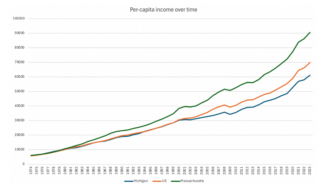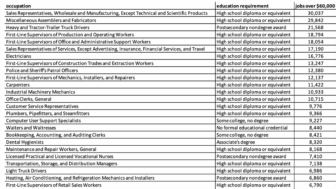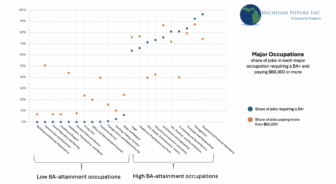
In an article for the Atlantic Seattle entrepreneur and venture capitalist Nick Hanauer writes: “Like many rich Americans, I used to think educational investment could heal the country’s ills—but I was wrong. Fighting inequality must come first.”
Hanauer, as we explored in a previous post, is decidedly left of center. His politics are pro capitalism and pro shared prosperity. He wants an American capitalism that as the economy grows benefits all. Has a broad middle class.
Hanauer makes two essential points in the article. First, and most importantly, is that the main cause of too many Americans struggling in a strong economy is that the economy is creating too many low-wage jobs. That there simply are not enough good-paying jobs that require post secondary skills/credentials to have an economy as it grows that benefits all. He writes:
… The job categories that are growing fastest, moreover, don’t generally require a college diploma, let alone a STEM degree. According to federal estimates, four of the five occupational categories projected to add the most jobs to the economy over the next five years are among the lowest-paying jobs: “food preparation and serving” ($19,130 in average annual earnings), “personal care and service” ($21,260), “sales and related” ($25,360), and “health-care support” ($26,440). And while the number of jobs that require a post-secondary education is expected to increase slightly faster than the number that don’t, the latter group is expected to dominate the job market for decades to come. In October 2018 there were 1 million more job openings than job seekers in the U.S. Even if all of these unfilled jobs were in STEM professions at the top of the pay scale, they would be little help to most of the 141 million American workers in the bottom nine income deciles.
His second essential point is that the single most effective way to improve education attainment is higher household income. He writes:
Multiple studies have found that only about 20 percent of student outcomes can be attributed to schooling, whereas about 60 percent are explained by family circumstances—most significantly, income. Now consider that, nationwide, just over half of today’s public-school students qualify for free or reduced-price school lunches, up from 38 percent in 2000. Surely if American students are lagging in the literacy, numeracy, and problem solving skills our modern economy demands, household income deserves most of the blame—not teachers or their unions.
Hanuer doesn’t believe that improving education is unimportant. He writes: “Make no mistake: Education is an unalloyed good. We should advocate for more of it, so long as it’s of high quality.” But, he continues “the longer we pretend that education is the answer to economic inequality, the harder it will be to escape our new Gilded Age.”
In many ways Hanauer’s evolution away from improving education attainment as the key to shared prosperity to an understanding that the key to shared prosperity are policies directly designed to raise the wages and benefits of those in jobs that do not pay family-sustaining wages mirrors the learning about the economy of Michigan Future.
We have always been focused on the economic well being of Michigan households. Our definition of economic success has always been a Michigan with a broad middle class. A status we enjoyed for most of the 20th Century but now have lost.
We began our work more that 25 years ago trying to learn what were the common characteristics of the most prosperous states and regions in America. And the primary answer kept coming back that what most characterized them was the proportion of adults with a four-year degree or more. That finding was true a quarter of a century ago and, if anything, it is more true today. By far the most reliable path to prosperity for each of us and for states and regions is college attainment. (You can read a summary of those findings here.)
So for years we recommended making preparing, retaining and attracting talent the state’s economic priority. What we didn’t understand well then––but do now––is that even in the most prosperous states and regions there were lots of households stuck in low-wage work. And that this is structural. No matter how strong the economy, there are going to be too many low-wage jobs.
As an example, Minnesota has, by far, the most prosperous economy in the Great Lakes. But in Minnesota in 2018 46 percent of payroll jobs are in occupations with median wages below the national median of $38,640. In metro Minneapolis––the Great Lakes most prosperous region––39 percent of jobs are in occupations with median wages lower than the national median.
Both are substantially better than the nation, Michigan and our two big metros, but still unacceptably too high. The nation has 51 percent, Michigan 58 percent, metro Detroit 47 percent and metro Grand Rapids 62 percent of their jobs in occupations with median wages below the national median.
So our new state policy agenda, A Path to Good-Paying Careers for All Michiganders, now identifies three levers as what matters most to creating an economy that meets the mission of a rising household income for all: increased education attainment; creating places where people want to live and work; and sharing prosperity with those not participating in the high-wage, high-education attainment knowledge-based economy.
Hanauer gets it right when he concludes:
If we really want to give every American child an honest and equal opportunity to succeed, we must do much more than extend a ladder of opportunity—we must also narrow the distance between the ladder’s rungs. We must invest not only in our children, but in their families and their communities. We must provide high-quality public education, sure, but also high-quality housing, health care, child care, and all the other prerequisites of a secure middle-class life. And most important, if we want to build the sort of prosperous middle-class communities in which great public schools have always thrived, we must pay all our workers, not just software engineers and financiers, a dignified middle class wage.







